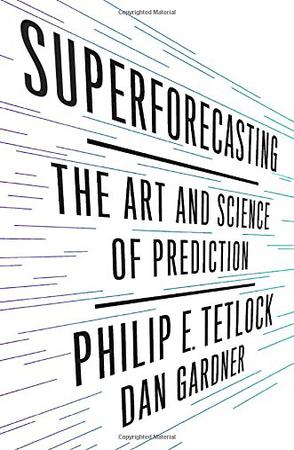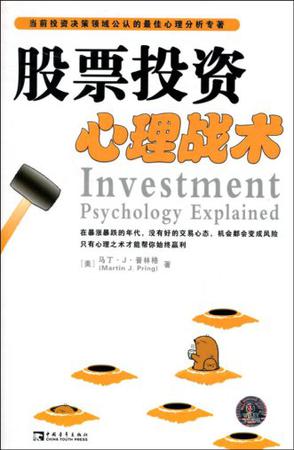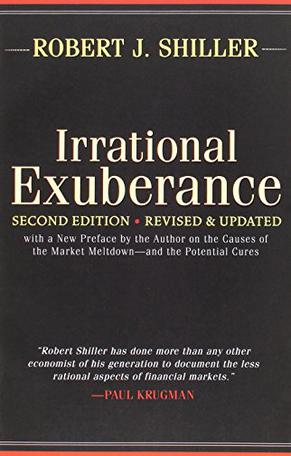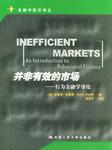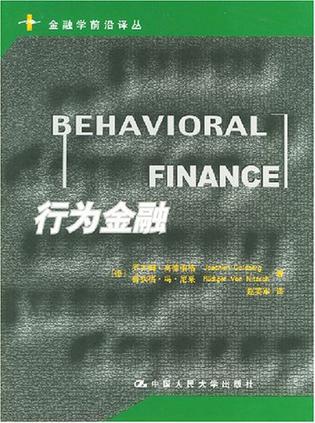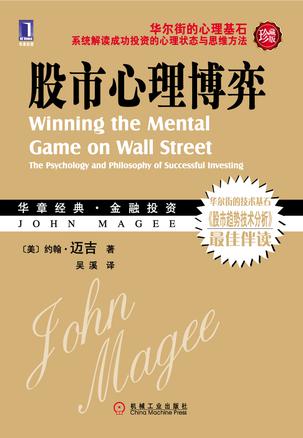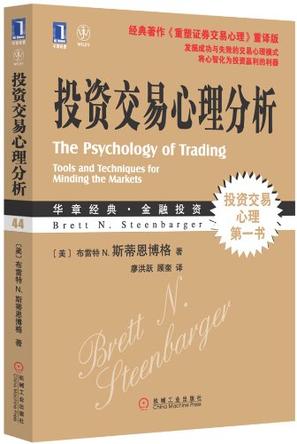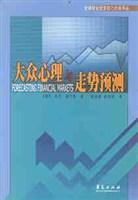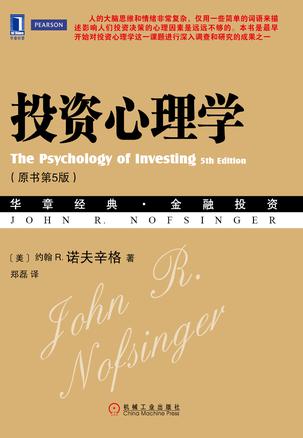欢迎来到相识电子书!
标签:投资
-
直觉交易商 开发你内在的交易智慧 罗伯特.库佩尔
直觉交易商:开发你内在的交易智慧》 一些人与生俱来,另一些人通过后天学习获得,而每个人都需要它。它是最伟大的市场智慧,是你通向财务成功之路的最关键的个性——它就是直觉。在本书中,罗伯特.库佩尔运用了他对市场的广博知识——从数十年的一线运作经验到与顶尖级交易商的具有远见卓识的交谈,为发展直觉交易技巧勾画出一幅迷人而具实践性的“蓝图”。 在生意场上,成功意味着你能将你的直觉提高到这样的水平,即怀着不 -
股票投资心理战术
《股票投资心理战术》这本书是作者马丁·J·普林格继全美畅销书《技术分析》出版之后,为分析股票投资心理所结集的精辟论著.希望藉此协助投资人度过股市风暴,并攫取稳定的利润。在《股票投资心理战术》中,作者强调研究分析的最要性,并重中耐性和自律的价值。作者甚至考察投资史上的名人,累积他们的智慧,增益投资人的投资经验。他所揭示的古典交易原则足历经时间考验的灵丹,掌握这些大师的交易秘诀,投资者就能够跑赢大市。 -
Irrational Exuberance
《非理性繁荣》书名取自美国联邦准备理事会理事主席葛林史班 1996 年底在华府希尔顿饭店演讲中,谈到当时美国金融资产价格泡沫时所引用的一句名言。从那时起,许多学者、专家都注意到美国股市因投机风气过盛而引发的投资泡沫现象。 Book Description In this timely and prescient update of his celebrated 2000 bestseller, Robert Shiller returns to the topic that gained him international fame: market volatility. Having predicted the stock market collapse that began just one month after the first edition was published, he now expands the book to cover other markets that have become volatile, particularly the recently red-hot housing market. He includes a full chapter on domestic and international housing prices in historical perspective. Shiller amasses impressive evidence to support his argument that the recent housing market boom bears many similarities to the stock market bubble of the late 1990s, and may eventually be followed by declining home prices for years to come. After stocks plummeted when the bubble burst in 2000, investors moved their money into housing. This precipitated the inflated real estate prices not only in America but around the world, Shiller maintains. Hence, irrational exuberance did not disappear—it merely reappeared in other settings. Building on the original edition, Shiller draws out the psychological origins of volatility in financial markets, this time folding real estate into his analysis. He broadens the evidence that investing in capital markets of all kinds in the modern free-market economy is inherently unstable—subject to the profoundly human influences captured in Alan Greenspan’s now-famous phrase, “irrational exuberance.” As was true of its predecessor, the second edition of Irrational Exuberance is destined to be widely read, discussed, and debated. Amazon.com CNBC, day trading, the Motley Fool, Silicon Investor--not since the 1920s has there been such an intense fascination with the U.S. stock market. For an increasing number of Americans, logging on to Yahoo! Finance is a habit more precious than that morning cup of joe (as thousands of SBUX and YHOO shareholders know too well). Yet while the market continues to go higher, many of us can't get Alan Greenspan's famous line out of our heads. In Irrational Exuberance, Yale economics professor Robert J. Shiller examines this public fascination with stocks and sees a combination of factors that have driven stocks higher, including the rise of the Internet, 401(k) plans, increased coverage by the popular media of financial news, overly optimistic cheerleading by analysts and other pundits, the decline of inflation, and the rise of the mutual fund industry. He writes: "Perceived long-term risk is down.... Emotions and heightened attention to the market create a desire to get into the game. Such is irrational exuberance today in the United States." By history's yardstick, Shiller believes this market is grossly overvalued, and the factors that have conspired to create and amplify this event--the baby-boom effect, the public infatuation with the Internet, and media interest--will most certainly abate. He fears that too many individuals and institutions have come to view stocks as their only investment vehicle, and that investors should consider looking beyond stocks as a way to diversify and hedge against the inevitable downturn. This is a serious and well-researched book that should read like a Stephen King novel to anyone who has staked his or her future on the market's continued success. --Harry C. Edwards From The New Yorker During the past decade, he has emerged as a leader in the new field of "behavioral finance" which seeks to apply lessons learned from other academic disciplines, particularly psychology to economics. Irrational Exuberance is not just a prophecy of doom. Encompassing history, sociology, and biology, as well as psychology and economics, it is a serious attempt to explain how speculative bubbles come about and how they sustain themselves. John Cassidy From Library Journal Taking his book's title and thesis from Alan Greenspan's 1996 description of investors, Shiller (economics, Yale Univ.) studies the current booming U.S. stock market in historical terms. His research into past U.S. and international markets indicates that during every speculative bubble there was always widespread consensus that high valuations were justified by each market's special circumstances. Every large market correction seemed to result from popular consensus rather than specific events or news. Shiller says that past bull and bear markets, though often based initially on sound fundamental reasoning, fed upon themselves to go beyond what the facts justified. He challenges the efficient market theory, demonstrating that markets cannot be explained historically by the movement of company earnings or dividends. He concludes that the current U.S. stock market is a speculative bubble awaiting correction. While the book certainly belongs in all academic business collections, public libraries should also purchase it as a counterweight to the plethora of get-rich-quick investment guides. -Lawrence R. Maxted, Gannon Univ., Erie, PA From The New York Times Book Review No one has explored the strange behavior of the American investor in the 1990's with more authority, or better timing, than Robert J. Shiller. Louis Uchitelle About Author Robert J. Shiller is the Stanley B. Resor Professor of Economics at Yale University. He is the recipient of the 2000 Commonfund Prize, awarded for Best Contribution to Endowment Management Research, for Irrational Exuberance. He is also the author of Market Volatility and Macro Markets, which won the 1996 Paul A. Samuelson Award. Book Dimension : length: (cm)23.3 width:(cm)15.4 -
别再上自己的当
林肯曾经说过:“如果要花八个小时砍倒一棵大树,那么他就会花六小的时间,把自己的斧头磨得锋利。”那么你在投资之前,是否也愿意花上一些时间了解自己心理上的误区吗? -
股市大众心理解析
在股市中,众多投资者会进行各自不 -
投资者大脑使用手册
《投资者大脑使用手册》内容简介:大脑的某些决策方式很诡异。可惜的是,在金融市场上,这种“诡异”的决策方法对获利并没有帮助。没有人比作者理查德·彼德森更明白这一点。彼德森是市场心理咨询公司的创始人,以前曾做过交易员,并且开发了心理导向交易系统,还做过操盘手,他很清楚潜意识的偏差对投资决策造成的负面影响。 今天,通过《投资者大脑使用手册》一书,彼德森希望与您共同分享他在这一领域的宝贵经验。在神经金融学——神经科学在投资上的应用研究——心理学以及行为金融学等学科最新研究成果的支持下,《投资者大脑使用手册》详尽说明了多数投资者所犯的“先天性”错误,以及克服决策障碍,改善投资技巧的简单方法。 《投资者大脑使用手册》一书简单介绍了最基本与最常见的投资偏差,列举长期资本管理公司、牛顿与南海泡沫、马克·吐温与19世纪60年代淘银热潮等例证。全书分为以下四个部分: 第一篇:当大脑遇见金钱。大脑的基本运作功能,以及大脑不适合现代金融市场动态的原因。 第二篇:情绪与投资决策。投资判断如何受到情感及化学作用的影响,以及优秀投资人具备哪些特质。 第三篇:大脑的金钱思维。最常见的投资思维陷阱,以及评估投资机会与风险时的错误观念。 第四篇:投资决策实务。如何管理投资思维,以及投资人进行策略规划时的心理建议。 书中举出许多丰富精彩的实务案例,协助读者找出深藏在潜意识之中的偏差,了解大脑的思考何时对投资过程有益,何时无益,改善情商,着重决策流程,而非结果。 -
亿万富翁想的和你不一样
《富爸爸,穷爸爸》作者罗伯特•清崎 鼎力推荐 备受欧美工薪族推崇的致富经典 理财盲也看得懂的理财书 即使剥夺了洛克菲勒、盖茨或巴菲特的所有财产,让他们和你站在同一个起跑线上,他们依然能迅速重建自己的财富帝国——因为他们拥有亿万富翁思维。 亿万富翁箴言: 失败并非终局——请有意识地提高你的挫折商 坚持每个月读两本书——知识是开启财富大门的钥匙 时间是我最大的一笔投资——它是我最珍贵的资产 失败9次也没关系——只要再努力1次,说不定有千万美元进账 内容简介: 一名工薪族十年内成为亿万富翁的致富自白 洛克菲勒、比尔•盖茨、沃伦•巴菲特、唐纳德•特朗普…… 为什么他们可以成为亿万富翁? 亿万富翁和一般人有什么区别? 斯科特•安德森用自己的亲身经历证明:他们能成为亿万富翁是因为他们想的和你不一样! 想要像斯科特•安德森一样在一年之内就从一个“穷忙族”变成一名亿万富翁,你只需要“窃取”亿万富翁们的想法和思路就行——斯科特全面总结了以下七个“富翁思路”: 金钱 你总在盘算着如何花钱;亿万富翁却在思考如何用钱生钱 投资 你根本就没有投资的概念;亿万富翁则把投资看成致富关键 工作 你会固守一份工作;而亿万富翁知道:工作根本不可能让自己成为富翁,只有投资才会 风险 为了避免失败,你总想远离风险;亿万富翁却知道避免风险本身就意味着失败 问题 你总是尽量避免问题;亿万富翁却把问题看成是赚取万贯家财的大好机遇 知识 你总是临时抱佛脚;亿万富翁则在平时广泛汲取知识并最终厚积薄发 时间 你总在浪费时间;亿万富翁则把时间看成最珍贵的资产 -
并非有效的市场
并非有效的市场:行为金融学导论,ISBN:9787300045849,作者:(美)安德瑞·史莱佛(Andrei Shleifer)著;赵英军译校 -
预测业神话
天气冷暖、经济兴衰、股市涨跌、技术进步、人口趋势、社会发展、组织行为,与我们生活息息相关的这7大领域充斥了太多的预测与“神话”。然而,我们回顾一下,这些预言到底有多少科学性,有多大的可靠性呢?我们把未来押在这些所谓“高明”的预言之上值得吗? 本书作者借助混沌概念和复杂性理论,以真实生动、饶有趣味的案例和真实的数据,揭示了上述7种领域的种种虚妄与谎言,告诉我们“预测不可靠”。这是因为我们生活的 -
有钱人性格说明书
《有钱人性格说明书》已经畅销多年了,日本心理学大师的佳作,在日本流行过很多年,没正经归类心理学专著,热卖历程中被读者一路追捧。现在专为拯救“穷忙族”而来。实话实说,应该定性为,一本没有术语、没有数据、没有说教的“三无伪心理学专著”。有性格分析,有富人传奇,不算晦涩,但绝对精准。 -
行为金融
《行为金融》对寻求更好的投资机会时遇到的有关决策问题进行研究,论述决策如何引起证券市场价格波动,以及投资者如何选择信息和交流信息。 -
股市心理博弈
迈吉的《股市趋势技术分析》是该领域公认的圣经,而迈吉的系统几乎是股票长期投资者成功的保证。不过,只有把《股市心理博弈》和《股市趋势技术分析》一起阅读,才能完整得到现代投资所需要的所有要核。成功的股市投资既需要技巧,又需要心理,就如同“剑术”需要和“剑气”结合,才能天下无敌。《股市心理博弈》为你拨开迷雾。原来股票操作的实质是一场心理游戏,不仅是与市场本身角逐,更是与内心顽固的自我对抗。阻碍成功投资的,正是潜移默化的思维定势和误导性习惯。很多人都在多年后读到本书慨叹:为什么自己没有一开始就得到这样的真正指导?那么希望读者你,不要再有这样的遗憾,愿它陪你在股市一路走好! -
投资交易心理分析
《投资交易心理分析》内容简介:战胜自身心智才可战胜资本市场,破解心理谜团方能胜出投资博弈。当市场跟你耍花招时,你不再困惑,取而代之的是一种“曾经沧海”的感觉,任何东西都无法替代因经验而产生的自信。再好的投资策略与交易系统都要经受交易心理的考验。 《投资交易心理分析》尝试以心理诊断的方法对待交易,将投资者的思维、情感、冲动与行为模式视为有用的市场数据。 《投资交易心理分析》试图教授投资者转变交易思维,并不断地从自我反应中学习。通过了解市场,完善自我;通过完善自我提升交易。 《投资交易心理分析》以心理案例为引子,逐章探讨了交易方案解决之道,如何应对交易风险,如何制定交易规则并控制自身情绪,如何把握市场情绪,如何面对以往失败的交易体验,发掘交易中的市场心理信息等重要内容,以平实地语言揭示了交易背后的心理真相。 -
投资心理规则
编辑推荐:该书共5篇19章内容,作者以简洁流畅的语言描述了人类群行为、群体心理和群体思维模式在证券市场中特有的程序化表现,尤其侧重于自我提高和获胜心理的研究,将投资心理提高到了一个新的水准。它清楚地指导投资者如何思考,该做什么以及何时去做。 该书适合广大证券投资者及证券理论研究者阅读参考。 -
股市心理学
股市心理学:向恐惧、贪婪和市场的非理性宣战,ISBN:9787508601168,作者:(英)乔纳森·迈尔斯(Jonathan Myers)著;虞海侠译 -
大众心理与走势预测
大众心理与走势预测,ISBN:9787508025650,作者:(英)托尼·普卢默(Tony Plummer)著;张海涛,赵洪清译 -
投资心理学
本书的内容并非是要取代传统金融中的投资理论,了解心理偏差,是对传统金融方法的一种补充。实际上,在读完本书之后,你会认识到传统金融工具的价值。最重要的也许是投资者的推理失误会影响他们的投资,并最终影响到他们的财富。如果投资者在决策过程中受到心理偏见的控制,即便懂得现代投资方法,也可能遭遇投资失败。通过阅读本书,你可以: 学到许多可能影响投资决策的心理偏见; 了解这些心理偏见如何影响投资决策; 看到这些错误决策怎样侵蚀你的财富; 学习如何识别和避免投资中的失误。 纠正心理偏差,避免投资的心理陷阱,战胜市场 有一则古老的华尔街格言说的是:市场是被两个因素驱动着——恐惧和贪婪。很多人会说,贪婪在20世纪90年代高科技泡沫期间主导了市场,而在最近一次金融危机中,则是恐惧情绪控制了人们的行为。尽管这话说得没错,但这种界定未免过于简单化了。人类的头脑和情感如此复杂,仅用恐惧和贪婪情绪来解释人们在决策中所受到的影响,显然是不够的。本书是最早探索这一重要且引人入胜的主题的著作之一。 第5版增加了新的内容,描述了心理学在抵押贷款领域和金融危机爆发中所起的作用。
热门标签
下载排行榜
- 1 梦的解析:最佳译本
- 2 李鸿章全传
- 3 淡定的智慧
- 4 心理操控术
- 5 哈佛口才课
- 6 俗世奇人
- 7 日瓦戈医生
- 8 笑死你的逻辑学
- 9 历史老师没教过的历史
- 10 1分钟和陌生人成为朋友


